Impact
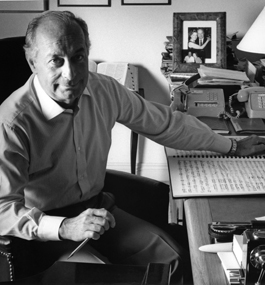
Henri Lazarof, MFA’59
A Living Legacy for a Prolific Composer
Renowned classical music composer Henri Lazarof, MFA’59, didn’t want notes and measures to live only on paper. He devoted much of his time to writing compositions — a total of 126, including many award-winning ones — and always believed music should be played and enjoyed.
The creation of the Henri Lazarof Living Legacy at Brandeis ensures Lazarof’s compositions and those of other composers will be played and celebrated. The legacy, made possible by a gift to the university, includes the Henri Lazarof Archives at Brandeis, the Henri Lazarof Concert Series at Brandeis, the Henri Lazarof New Music Brandeis Annual Concert, and a composition competition called the Henri Lazarof International Commission Prize, as well as orchestral concerts and recording projects.
“The world is big enough for all kinds of composers,” Lazarof once said. “I try to always write for new instrumental forces — to search out the limits of the performer and one’s own limits as a composer.”
This gift will help perpetuate that ideology. “The Henri Lazarof Living Legacy will support a number of exciting programs and opportunities for research at Brandeis,” says Mark Berger, PhD’12, associate professor of the practice of music and music department chair. The support will allow Lazarof’s prolific compositional voice, which Berger describes as “exquisitely crafted and intricate, yet always highly expressive to the core,” to continue to be heard, while encouraging the creation and performance of new music.
Sarah Shoemaker, head of the Robert D. Farber Archives and Special Collections at Brandeis, says, “The Henri Lazarof Archives will provide students and scholars at Brandeis and beyond a unique view into the trajectory of one person’s life as a 20th-century composer.”
In addition to composing, Lazarof, who died in 2013 at age 81, was also a conductor, pianist and teacher. Born in Sofia, Bulgaria, he became a concert pianist at a young age but soon switched to composing. By age 10, he was literate in French, German, Ladino and Bulgarian. Upon arriving at Brandeis, where he studied for a time, he also became fluent in English, one of seven languages he spoke fluently.
A story from Lazarof’s childhood reflects his sense of justice and determination. After the Nazis took over his family’s business, Lazarof went to his father’s office to retrieve his bicycle, which had been left behind. He found a Nazi general with his feet up on his father’s desk.
“Well, what are you doing here?” the general asked.
Lazarof replied, “I’m here to get my bicycle.” Achieving his goal, he rode home.
In his teens, Lazarof and his family immigrated to Israel. He studied with a prominent Israeli composer and served in the Israeli army, writing compositions and organizing concerts for the troops. He won the first musical scholarship awarded in Israel to attend the prestigious St. Cecilia Academy of Music in Rome, studying with composer Goffredo Petrassi.
Kenneth Levy, a music professor at Brandeis, convinced Lazarof to pursue graduate studies in the U.S. Lazarof came to Brandeis, studying with storied music professors Harold Shapero and Arthur Berger. In 1966, he moved to California, where he taught music composition at UCLA for more than 30 years; organized music festivals; and served as composer-in-residence in a variety of locations, from Berlin to Tanglewood.
The works Lazarof wrote include seven symphonies, numerous concertos, 11 string quartets, vocal music, and many other chamber and symphonic works. His compositions were known for their broad range of textures, dynamics and diversity of rhythms, with many featuring unusual combinations of instruments. His works were commissioned and recorded, and premiered by many orchestras throughout Europe, Asia and the United States.
Lazarof’s passion for art was reflected in his music, such as the String Quartet No. 8 (“Homage to Paul Klee”) and “Tableaux (After Kandinsky),” premiered by the Seattle Symphony Orchestra.
He received many worldwide prizes, including first place in the International Tchaikovsky Competition. He also received grants from the Ford Foundation and the National Endowment for the Arts, and earned two Grammy nominations in 1991.
Violinist Yukiko Kurakata, former artistic director of Chamber Music/LA, performed several of Lazarof’s commissioned compositions. She described his work as having “a perfect balance between craftsmanship and beauty.”
In a 1989 review of pieces by Lazarof, LA Times critic Daniel Cariaga said the music resisted “easy descriptions” and was “deeply connected to the traditions of Brahms and Ravel (and others), but articulate of contemporary musical sensibilities.”
With the creation of the Henri Lazarof Living Legacy, Lazarof’s unique style will live on in perpetuity at Brandeis.

Zamira Korff
Women Are the Future
Celebrating the launch of the Brandeis Women’s Network by university alumnae gives us an opportunity to recognize female leadership at Brandeis.
We have an abundance of accomplished women at this university. One — Debbie Bial ’87, H’12, a university trustee, and president and founder of the Posse Foundation — inspired attendees at a recent Women’s Network event. For her work empowering young people through educational access, Bial has been awarded a MacArthur “Genius” fellowship. Two female Brandeis professors — Bernadette Brooten, the Myra and Robert Kraft and Jacob Hiatt Professor Emerita of Christian Studies, and Gina Turrigiano, the Joseph Levitan Professor of Vision Science — have also received “Genius” grants.
At Brandeis International Business School’s 25th-anniversary celebration, I learned much about the late Rachel McCulloch, trailblazing economist and co-founder of the school’s PhD program, from former Federal Reserve chair Janet Yellen, Rachel’s good friend. During the weekend, Janet announced the creation of a scholarship fund to honor Rachel, who was universally beloved by students and colleagues.
I also want to recognize the immeasurable contributions of Barbara Mandel, P’73, H’19, who passed away this fall, one month after her late husband, Morton, P’73, H’89 (see the remembrance on page 70). I got to know Barbara through her role as a Brandeis trustee, and was consistently amazed and humbled by her passion for this university. On the global stage, Barbara provided incomparable leadership for organizations that help advance women and the Jewish community. On our campus, the Mandel Foundation has transformed the study of humanities and Jewish education. The couple will be profoundly missed.
Brandeis’ tradition of access ensured that, from its founding, women were welcomed on equal footing with their male counterparts. This tradition endures today: Women make up more than 60 percent of undergraduate enrollment. Moreover, our Michtom School of Computer Science bucks the conventional thinking that computer science is a male-dominated field. Today, women compose 32 percent of the major at Brandeis (compared to the nationwide average of 19 percent).
Finally, we mustn’t forget that nearly 50 percent of our trustees are women, as are our provost and half of our deans.
During my time here, I’ve met many female leaders who continue to inspire me. If the past is prologue, the future of female leadership at Brandeis is on a promising trajectory.
Sincerely,
Zamira Korff
Senior Vice President of Institutional Advancement
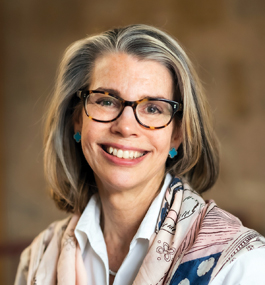
Hannah Peters
University Welcomes New VP of Development
Hannah Peters, former associate dean for development and external relations at the Harvard Divinity School, has joined Brandeis as vice president of development.
Peters oversees fundraising activities in the Institutional Advancement division and implements strategies to ensure the achievement of fundraising goals across the university.
“Hannah Peters brings deep knowledge and a versatile skill set that draws on decades of proven success in fundraising leadership,” says Zamira Korff, senior vice president of institutional advancement. “She adds tremendous value and insight to help drive our future growth.”
Peters joins Brandeis after a 20-year tenure at Harvard. She joined that university in 1999 as Harvard Business School’s director of corporate relations. Later, as associate dean for external relations at the Harvard Graduate School of Design, she reinvigorated the school’s external relations program and prepared the groundwork for a campaign. Finally, as associate dean at Harvard Divinity School, she led its first major, comprehensive fundraising campaign in over a decade.
Before joining Harvard, Peters served as director of corporate relations at the Stanford University School of Engineering, and director of corporate and foundation relations at Tufts Medical Center. Her nonprofit work has included positions at Asia Society and the Executive Council on Foreign Diplomats, both in New York.
She earned a bachelor’s in foreign service from Georgetown, and a master’s in international affairs and journalism from Columbia.
“I am thrilled to join Brandeis at such a pivotal time in its history,” Peters says. “I look forward to advancing the university’s mission and to engaging with the community as we embark on its next chapter.”
Picture-Perfect
A photo gallery from events and meetings around the world.
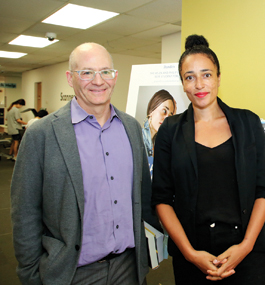
Author Zadie Smith with English professor John Plotz at Brandeis’ 28th annual Helen and Philip Brecher New Student Forum. Smith discussed her novel “Swing Time” and answered questions from community members, including Brandeis first-years, who received a copy of the book before they arrived on campus through the Helen and Philip Brecher Endowment Fund.
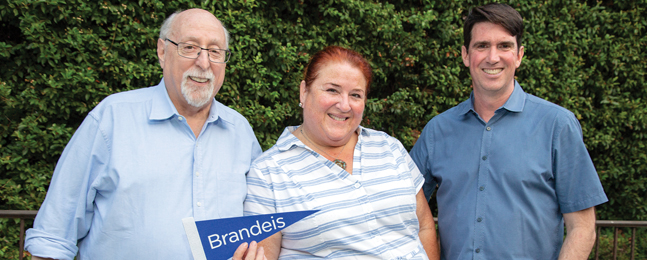
Former Wall Street Journal tech columnist Walt Mossberg ’69 (left) teamed up with co-founder of Siri and Change.org Adam Cheyer ’88 (right) to chat about all things tech at an event hosted at the Beverly Hills home of Lisa Field ’82 (center).
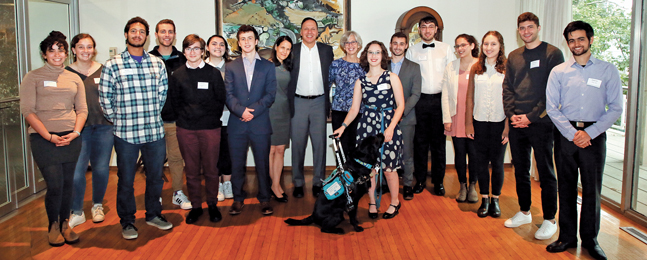
Recipients of the Edward Fein Scholarship with President Ron Liebowitz and his wife, Jessica, at an annual luncheon. The Edward Fein Scholarship is awarded to students from Arizona, California and Nevada who have shown leadership through active participation in the Jewish community.
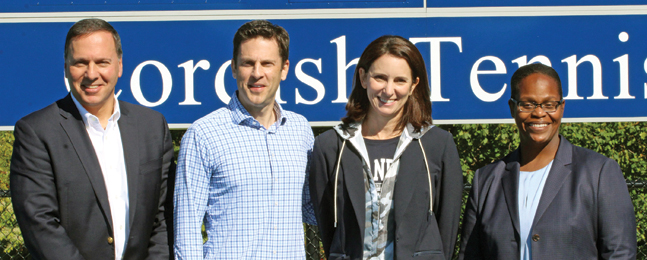
Dedicated during Homecoming 2019, the new Cordish Tennis Center — made possible by a gift from Jonathan and Melissa Cordish, both ’90 — will benefit current players, new recruits and fans of the Brandeis tennis program. From left: President Ron Liebowitz, Jonathan and Melissa Cordish, and director of athletics Lauren Haynie.
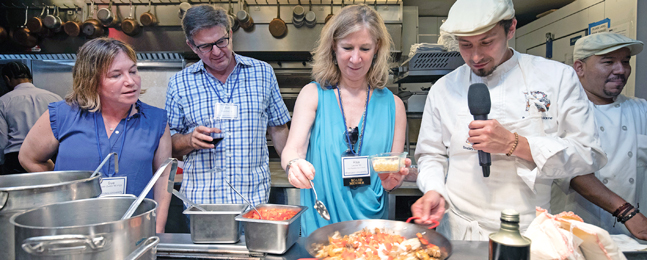
Justice Brandeis Society members enjoyed an exclusive epicurean experience at Bouley Test Kitchen, in New York City, sponsored by Sarah and Daniel Rueven, both ’09. Here, Susan Loeb Zeitlin ’90, P’23; Richard Greenfield ’95; and Risa Levine ’83 get hands-on during a cooking demonstration.
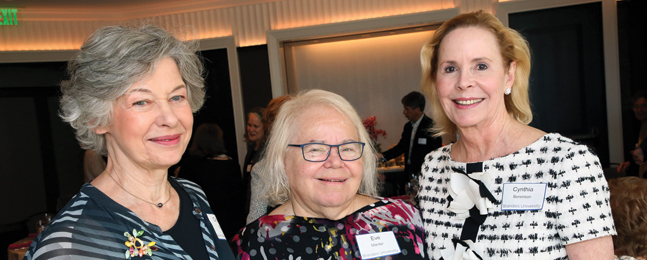
Charlotte Nassim, author of “Lessons From the Lobster,” which details the research of pioneering neuroscientist and University Professor Eve Marder ’69, with Marder and Trustee Cynthia Berenson, G’13, at a September luncheon that celebrated women in science, hosted by Berenson at the Four Seasons Hotel Boston.
